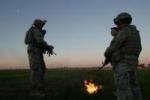Here's what we did.
I established curfew after sunset. We conducted night patrols to enforce the curfew. Trust me, it's hard to differentiate from someone emplacing an IED at night and some drunken farmer sneaking out of his house to have a drink (and not let his wife find out).
During the night patrols, we stopped in at houses for several purposes:
1. Establish our presence.
2. Spot-check to make sure our food was going to the families.
3. Provide medical care to kids.
4. Covertly talk to our trusted sources.
As time passed, the women started telling us where the bombs were planted and where the safehouses were.
v/r
Mike






Bookmarks